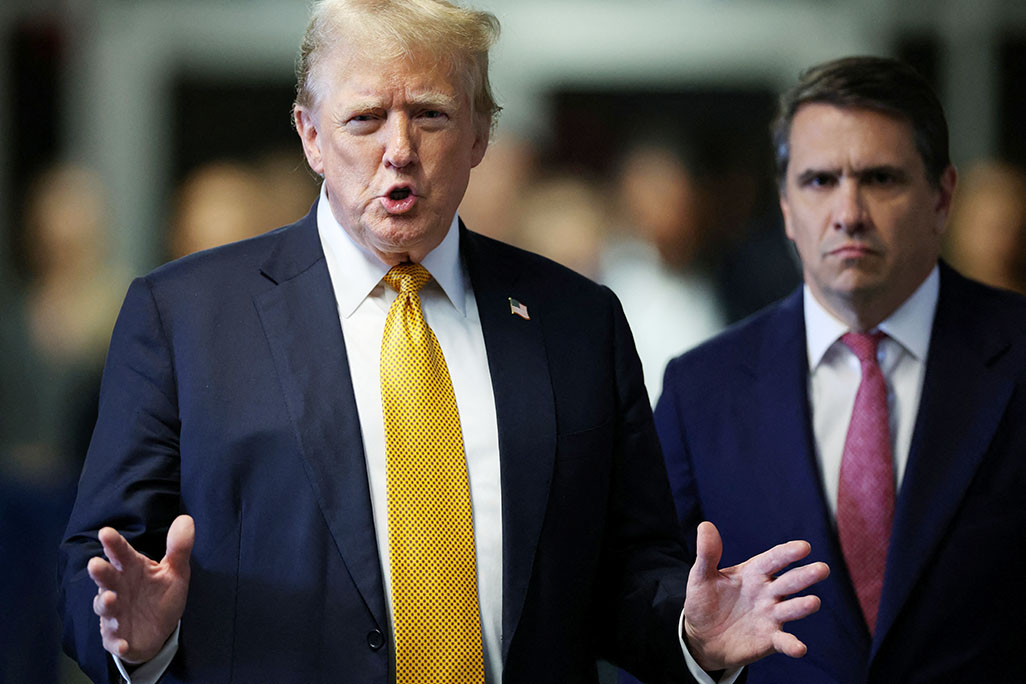Jurors in Donald Trump’s hush money trial asked for transcripts of some witness testimony on Wednesday as they weighed the fate of the first U.S. president to be charged with a crime.
The request to the judge came two and a half hours after jurors began closed-door deliberations. It was unclear how long they would take to reach a verdict.
Trump, 77, is charged with falsifying business documents to cover up a hush money payment to porn star Stormy Daniels shortly before the 2016 presidential election. He has pleaded not guilty and denies wrongdoing.
In a written note, jurors asked Justice Juan Merchan for a transcript of testimony by star witness Michael Cohen about a meeting the former Trump fixer says he had with his boss at Trump Tower in Manhattan. Multiple Trump Tower meetings were referenced at the trial, and it was unclear which one jurors wanted to scrutinize.
Jurors also asked for portions of testimony by former National Enquirer publisher David Pecker, who said on the witness stand that he kept an eye out for stories that might have damaged Trump’s candidacy and worked with Trump’s campaign to keep them from being published.
Jurors asked for transcripts of testimony where Pecker discussed former Playboy model Karen McDougal, who says she had an affair with Trump in 2006 and 2007, as well as other portions of Pecker’s testimony where he talked about a phone call with Trump and a meeting at Trump Tower.
Shortly before deliberations began, Merchan told jurors to apply extra scrutiny to Cohen because he was an accomplice to the payments at the heart of the case.
“Even if you find the testimony of Michael Cohen to be believable, you may not convict the defendant solely on that testimony unless you find it was corroborated by other evidence,” Merchan said.
Merchan’s comments were part of his detailed instructions to the 12 jurors and six alternates who have sat silently in a New York courtroom for weeks while prosecutors laid out their case and Trump’s lawyers tried to knock it down.
“You must set aside any personal opinions or bias you might have in favor of or against the defendant,” Merchan said.
Any verdict requires unanimous agreement by all jurors. The judge will declare a mistrial if they are unable to resolve their differences.
A guilty verdict could upend the 2024 presidential race, in which Trump, the Republican candidate, is seeking to take back the White House from Democratic President Joe Biden in the Nov. 5 election.
Trump has cast the trial as an attempt to undercut his presidential bid. “Mother Teresa could not beat these charges,” he told reporters outside the courtroom, referring to the late Nobel Peace Prize laureate. “The whole thing is rigged.”
Merchan’s instructions underlined the pivotal role played by Cohen, who was Trump’s lawyer and fixer for roughly a decade before they had a falling out.
Cohen testified that he paid $130,000 out of his own pocket to prevent Daniels from telling voters about the alleged sexual encounter with Trump that she says took place 10 years before the 2016 election. Trump denies having had a liaison with Daniels or a relationship with McDougal.
Cohen testified that Trump approved the payoff and agreed after the election to a plan to reimburse Cohen through monthly installments disguised as legal fees.
Trump’s lawyers have argued that jurors cannot rely on Cohen, a convicted felon with a long track record of lying, to tell the truth.
“He is literally the greatest liar of all time,” Trump lawyer Todd Blanche toll jurors on Tuesday.
In his closing argument on Tuesday, prosecutor Joshua Steinglass walked jurors through voice messages, emails and other documents that he said backed up Cohen’s testimony.
Prosecutors from Manhattan District Attorney Alvin Bragg’s office say the Daniels payment could have contributed to Trump’s 2016 victory over Democrat Hillary Clinton by keeping an unflattering story out of the public eye.
“We’ll never know if this effort to hoodwink the American voter impacted the election,” Steinglass told jurors on Tuesday.
Prosecutors face the burden of proving Trump’s guilt “beyond a reasonable doubt,” the standard under U.S. law.
A conviction will not prevent Trump, from trying to take back the White House. Nor will it prevent him from taking office if he wins.
Opinion polls show Trump and Biden locked in a tight race. But Reuters/Ipsos polling has found that a guilty verdict could cost Trump support among independent and some Republican voters.
Trump faces up to four years in prison if found guilty, but those found guilty of the crime he is charged with are more often fined or given probation.
A verdict of not guilty would remove a major legal barrier, freeing Trump from the obligation to juggle court appearances and campaign stops. If convicted, he would be expected to appeal. Trump faces three other criminal prosecutions, but they are not expected to go to trial before the Nov. 5 election.
Biden campaign officials say any verdict will not substantially change the dynamics of the election.






Click here to change your cookie preferences